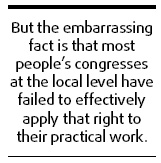Editorials
Role of people's congresses
(China Daily)
Updated: 2010-01-07 07:52
 |
Large Medium Small |
Guangzhou began the year with not only a unique New Year gift for its residents, but also a breakthrough of national significance in granting a greater supervisory role to the local people's congress over the local government.
The city's act, effective Jan 1, stipulates that decisions on such issues as education, health care, the price of public utilities and other important matters that affect the livelihood of locals must receive approval from the standing committee of the municipal people's congress before implementation. It also requires that the people's congress has the power to revoke decisions by the local government that are unsuitable.
The local rules adopted by the city people's congress of Guangzhou, South China's Guangdong province, are simply a reiteration of that right.
But the embarrassing fact is that most people's congresses at the local level have failed to effectively apply that right to their practical work. To be exact, the administrative power of most local governments has far outweighed the supervisory right of people's congresses at the same level.

This explains why quite a number of local governments get deeply involved in specific construction projects and an increasing number of local government leaders have fallen to corruption. At the same time, public grievances against local governments have been on the rise.
To check the power of local governments, in particular top leaders, is important to local residents and to the stability of this country and rule of the Party.
Guangzhou has been a pioneer in the country's economic reform. The Guangdong provincial Party committee decided in 2008 that this provincial capital, on a trial basis, will be the focus in the development of democracy and rule of law.
As one official of the Guangzhou people's congress standing committee says, this document has specified exactly what issues need to be approved by the congress. The specifications make it possible and easy for the city people's congress to employ its right.
The withdrawal of a garbage incinerator plan late last year in the city's Panyu district is a clear example of how necessary the democratic process is needed for important decisions on projects that affect local residents. The decision to approve the incinerator was made by the district government alone, but was strongly opposed by local residents because of the potential air pollution. The district government eventually gave up the project and promised that any decision concerning the interest of local residents would first get their consent.
The new act, if implemented to the letter, will provide a legal guarantee that the decision-making process by the people's congress will leave no room for arbitrary decisions from the city government.
(China Daily 01/07/2010 page8)













